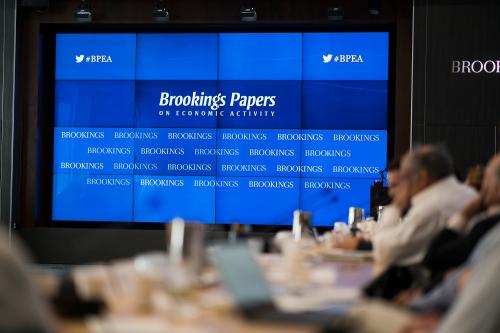Dozens of the best thinkers in economics and social policy gathered in Washington, D.C. this week to discuss new research published in the Brookings Papers on Economic Activity (BPEA), the academic journal published twice a year by the Economic Studies program at Brookings. BPEA has been informing public policy since 1970.
The Fall 2017 edition of the journal includes five new papers on everything from the opioid epidemic to bank capital regulation and populism in Europe. To learn more, read all the new research here.
Don’t have time to read the papers cover-to-cover? Here are the highlights:
Over the past 15 years, the labor force participation rate fell more rapidly in counties where large numbers of opioids were prescribed.
Princeton economist Alan Krueger explains that the increase in opioid prescriptions could account for up to 20 percent of the decline in the men’s labor force participation rate from 1999 to 2015. Krueger also discusses the regional variation in opioid prescription rates across the U.S., concluding that disparities in prescription rates resulted in a large part from differences in medical practices, not differences in patient health conditions.

It would be a mistake to substantially lower bank equity capital requirements
Former Federal Reserve Governor Jeremy Stein and Harvard colleagues Robin Greenwood, Samuel G. Hanson, and Adi Sunderman argue that bank capital requirements shouldn’t be lowered, but post-crisis rules should be simplified to ensure all banks are subjected to the same minimum requirements. They write that, “current levels of capital in the U.S. banking industry are near the lower end of what would seem to be a generally reasonable range.” They even suggest that “adding a few more percentage points to risk-based capital ratios, especially for the largest banks, would be socially beneficial.”
When different banks are subject to a range of different rules for setting bank capital requirements, banks are discouraged from specializing in what they do well
Greenwood, Hanson, Stein, and Sunderman also highlight a problem that’s emerged from financial regulations implemented post-crisis: When different banks are subjected to different and overlapping rules and constraints for setting capital requirements, their business models begin to look more similar, which creates inefficiencies and hurts the economy.
The authors’ solution involves simplifying the rules, and giving regulators more flexibility in times of crisis. For a helpful summary of their proposal in full, read this take from David Wessel, Director of the Hutchins Center on Fiscal and Monetary Policy at Brookings.
Economic insecurity is a greater driver of European populism and anti-establishment voting than anti-immigrant or xenophobic attitudes
Yann Algan, Sergei Guriev, Elias Papaioannou, and Evgenia Passari find that economic insecurity resulting from the Great Recession—as opposed to anti-immigrant or xenophobic attitudes—is an important driver of populism and voting for anti-establishment political parties throughout Europe.
The authors find a statistically and economically significant relationship between regional unemployment and a decline in trust in political institutions, but a small or non-existent effect on trust in other people, police, or church, demonstrating that support for populist and anti-establishment political parties resulted from economic issues, rather than social issues.
 Low business investment in the U.S. is a result of decreased competition and tightened governance
Low business investment in the U.S. is a result of decreased competition and tightened governance
Despite high profits, low funding costs, and high asset values, business investment in the United States has remained at distressingly low levels since the early 2000s. Research by German Gutierrez and Thomas Philippon found that decreased competition and tightened governance helped explain this investment trend.
For more on the new research, read the full edition of the journal.






Commentary
The latest economic research: The opioids epidemic is hurting the labor force, unemployment drives European populism, and more
September 8, 2017